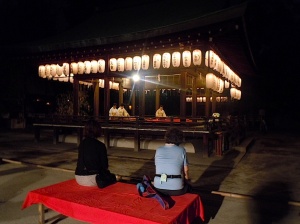 This week’s Der Spiegel has an interview with Umberto Eco on the subject of lists. Eco states that lists are stabs at immortality, an attempt to take control of the infinite through categorization:”We have a limit, a very discouraging, humiliating limit: death. That’s why we like all the things that we assume have no limits and, therefore, no end. We like lists because we don’t want to die.”
This week’s Der Spiegel has an interview with Umberto Eco on the subject of lists. Eco states that lists are stabs at immortality, an attempt to take control of the infinite through categorization:”We have a limit, a very discouraging, humiliating limit: death. That’s why we like all the things that we assume have no limits and, therefore, no end. We like lists because we don’t want to die.”
I’ve always attributed it to something less grandiose, the desire not to squander whatever limited time we have, or to just plain get organized.
Of course there’s always the old saw about cultural insecurity, particularly among Americans. Lists of cultural artifacts, books, paintings, films, have often been a quick way to stack ourselves up against others — “At least I’ve read Proust. Sniff.” I’ve seen evidence of this; a few months back, in fact, I was appalled when a social networking friend humorlessly posted the Booker list, and then checked off each one he had read, even adding the number of times read in parentheses. But we’ll leave him to his demons, and as long as one uses them playfully, lists can be good references, to safely shake us out of our habits, show us something new.
A few weeks back though, when jotting down ideas for a list-based project, I was suddenly overtaken by a severe, albeit brief spell of depression, not about mortality as Eco argues, but the recent prevalence of list-making in popular culture.
“The list doesn’t destroy culture; it creates it.” Eco says. “Wherever you look in cultural history, you will find lists.”
But if the list creates culture, what in fact is behind the creation of the lists?
I began to wonder about the increasing presence of the list, and not just those numbered sets of bullet points, but graphic organizers, Powerpoints, and so many creative works gleefully basing their form on the dumbed down worksheet absurdities of K-12 education. Take Sufjan Stephen’s grandiose plan to record an album for each of the 50 states, or the graphs albeit tongue-in-cheek in the Believer. This reverie then glommed onto NaNoWriMo, Edmo, Drunkmo, all of these attempts to impose creativity through organized allotments of time or space.
I’m not out to bash these things. I’m a participant in this year’s NaNoWriMo and believe me, it’s good to be writing rather than fretting over where my life is going. Besides, when you’re looking to brainstorm fiction ideas, lists are an insanely effective way to tap memories and ideas you had no clue were there.
But I also wonder if this recent surge in list making might not also be the result of our waning ability to organize our own thoughts.
Take research on multitasking, the implications of which are ignored in inverse proportion to the frightening results. According to an August article in Wired, Dr. Clifford Nass found that multitaskers do poorly on cognitive tests, showing an inability to ignore “irrelevant” information.“Whether people with a predisposition to multitask happen to be mentally disorganized, or if multitasking feeds the condition — “that’s the million dollar question.”
To add a ten-dollar question of my own, is this mental disorganization being fed by the computer, and is that in turn stoking our desire for order; is the smog build up in our gray matter behind our recent, and often misguided attempts to assign rank to novels, works of art, or experience itself? As much as I enjoy checking them off, you’ve got to admit that the 1001 Books/Places/Painting/Records to Read/Visit/See/Hear Before You Die series is not the end all and be all of taste.
As Nass states, acts of multitasking involve exploration, the act of gathering up as much information as possible over exploitation, focused concentration on what we’ve gathered. All of these lists seem provide the promise of exploitation, or a false sense of mastery over that information. But more importantly, I think they attract us because we can sense something is wrong. Lists provide a simplified route to exploitation, a cognitive lifeline to those flailing about in a morass of often irrelevant information.
 It’s been a very, very long time since I’ve posted. Bikes were ridden, temples were visited, and even a few kilos were lost, which has been great for the arthritis.
It’s been a very, very long time since I’ve posted. Bikes were ridden, temples were visited, and even a few kilos were lost, which has been great for the arthritis. Anyway, took the alternative route. Traded jogging for cycling, lost several pounds (not hard in Japan where you can get healthy food even at a 7-11), and now other than the occasional bout of night aches, I’m back to relative normalcy.
Anyway, took the alternative route. Traded jogging for cycling, lost several pounds (not hard in Japan where you can get healthy food even at a 7-11), and now other than the occasional bout of night aches, I’m back to relative normalcy.











